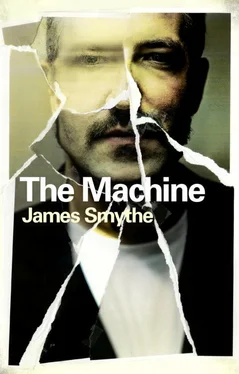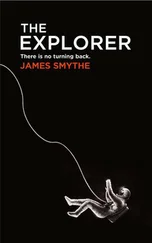The pitch-black casing is grotesque, she thinks. It seems so vast. She hasn’t joined it together yet, not where the clips and bolts require, but she can see it as if it was complete. On its side, a coiled power cable waits, like an umbilicus. The Crown has a dock above the screen, in the centre, and the whole thing seems unreal. She looks at it for too long, at how black it is. It almost fills the entire wall, and the shadow it casts is deep enough that she can’t see the wallpaper past it. This was the only place it could go, because of the shape of the room. She tries to move as far back as possible and take it all in, but it isn’t possible. It’s like a cinema screen when you sit near the front: never entirely encompassed by your vision.
She knows, to the day, how long it’s been since she last saw one of these. The last one was very different in some ways: it was smaller, she thinks, and the Crown wasn’t docked as it is in this one. It was wireless, where here there’s a thick cable that looks like it’s got sand stuffed inside it to keep it taut, and other lumps and bumps along the length of the pale-coloured rubber. The Crown itself is less flashy as well. This is definitely an older model, but she wasn’t looking for a new one. In the newer models, you couldn’t change anything. Firmware updates were automatic. The guides on the internet told her that she needed one she could change, and this was all she could find. Even then it was hidden away amongst useless husks and books and videos. She had to email the man directly to ask if he had any working Machines, and it took four emails (making her jump through hoops) before he trusted her enough to tell her his prices. This one was the oldest of the old. She still paid through the nose for it. But it was the only one she had found in six months of searching, and she hadn’t spent any money for the last few years beyond the essentials. This was a long-term plan, and she had saved accordingly. The email where he wrote the figure she would owe him made her cry: not from the enormity, but the relief.
She goes closer to the bulk of it. She remembers the one that Vic had during his treatments, and the way that it used to vibrate. They explained to her, once, about the power needed to run it. It’s one of the most powerful computers in the country, they said to her. (She supposes that, were they to be invented now, they would be put into a smaller package: something the size of a briefcase, maybe even as small as a telephone.) It used to vibrate right through the floors, and Vic would sit in the chair next to it and his teeth would chatter as he clenched them together, because he was bracing himself. The early sessions were the hardest. This Machine here isn’t even plugged in yet, and yet Beth puts her hand on it and would swear that she can feel the vibrations. The metal itself – that’s what it’s made of, some thick alloy that she couldn’t even name, that isn’t like anything she’s got in the house, not aluminium cans or the wrought-iron picture frame or the steel of that lampshade, but something else, like the material that the thing is made from was this shade of black to begin with – is coarse and cold, and she would swear carries some sort of residual shudder. She takes the plug from the side and uncoils it, and runs it to the base of the bed, where the room’s only sockets are. So much is wireless now and yet this needs hard-wiring. The ones that Vic used before were actually attached to the wall, part of the complex that they had to visit. They were monitored.
She goes to work on the bolts. They’re all hand-driven, none requiring custom tools, which is good. Some of them have connectors that need to be touching, but the deliverymen got them mostly lined up for her. All the insides are driven by conductive metal rather than wires, which makes them easy to assemble. Foolproof, even. The pieces sit perfectly flush when they’re connected and lined up, and it takes a bit of effort – heaving them a centimetre this way, a millimetre the other – but they satisfyingly click together. She can’t even see the lines between pieces when it’s done: it’s like a solid lump of black metal from the front, no seams, like something carved from the world itself. It looks, she thinks, almost natural. Like rock.
She drags the plug from the side and plugs it into the wall, and then strokes the screen. Doing this is like instinct. The screen flickers to life. There’s the familiar triple tone of the boot noise – ding-ding-ding, ascending and positive, full of optimism – and then the screen is awash with light. Beth hadn’t realized how covered in dust it was. She doesn’t know when this thing was last turned on, but the clock has reset. She pulls her sleeve down over her hand and wipes the screen off. She’ll do a better job later, but she wants to check that this all works before she gets her hopes up. The interface is exactly as she remembers, all big colourful buttons and words driven by positivity. Nothing negative. Even in the act of taking away they were reinforcing. PURGE, COMMIT, REPLENISH. She presses a button, through to sub-menus. There’s a button that offers her the chance to explore the hard drive, which she presses, but the drive is clear. That’s what she’d hoped for. She didn’t want somebody else’s memories lingering here. She heads out of the room and into the other bedroom, her bedroom. Compared to the Machine’s room, it’s chaos. Clothes everywhere, on the floor and bed, – she sleeps around them, making nooks in them where her body lies – and the walls stacked high with vacuum-packed bags full of clothes that she hasn’t worn in years, or that she kept of Vic’s. She keeps the hard drive under her bed, because that seemed like the safest place. If she got burgled, she didn’t want them to take it thinking that it would be worth anything. Pulling it out – it’s been in a box with remnants of who she was before, old library cards and birthday cards and childhood photographs – she walks into the room and sees the drive appear on the screen as she gets closer. It’s a first-generation capacitive wireless device, able to pick up on other wireless items in the vicinity and read their drives. A new option appears on the screen: a cartoonish image of a hard drive. She presses the button – her hands are shaking, because she’s worried that the drive might have wiped itself or corrupted over the past couple of years (ever since she backed up the contents from an older drive one New Year’s Day as she worried about it, worried about the life-span of these things) – and there it is: a folder named after her husband. She presses his name and waits as it loads.
There are hundreds of files inside, all date-stamped, and all under an umbrella of his name. She presses the first one, which she can barely remember being recorded because it was so long ago, and waits as it loads. A bar appears on the screen and an icon of a play button. She presses it and the Machine starts thrumming. The file starts loading. The technology isn’t there with the size of these files: the pristine nature of exactly what they’ve recorded, and how long they are. The amount of data that they contained inside the packets of the audio files themselves… Everything important. The audio is essentially worthless. It’s wrapping paper. But the files are enormous, and streaming them all is impractical. It would take far too long; too much waiting for them to load. She should be using the hard drive of the Machine itself, but she wants to check it works first. That, and she wants to hear him. She’s too eager.
Then the first file is done queuing itself up, and it plays automatically, and she hears somebody clearing their throat in the background, the click of something. Somebody sitting down. She doesn’t know where the speakers are in the casement, but they’re somewhere, or it uses the metal itself as a speaker. Maybe that’s where the vibrations come from: internal sound channelled outwards. She saw that once, when she was a teenager: something you could plug your iPod into and it would turn any glass table or window into a speaker. She remembers being impressed by it: as the boys that she knew ran around her parents’ house plugging it into everything they could find, dancing in their room full of art pieces as the glass covering a statue that her father described as priceless vibrated with the sounds of trilling keyboards and squawked singing. They danced on the rugs, because of the novelty of not being able to hear their own footfalls.
Читать дальше
Конец ознакомительного отрывка
Купить книгу










